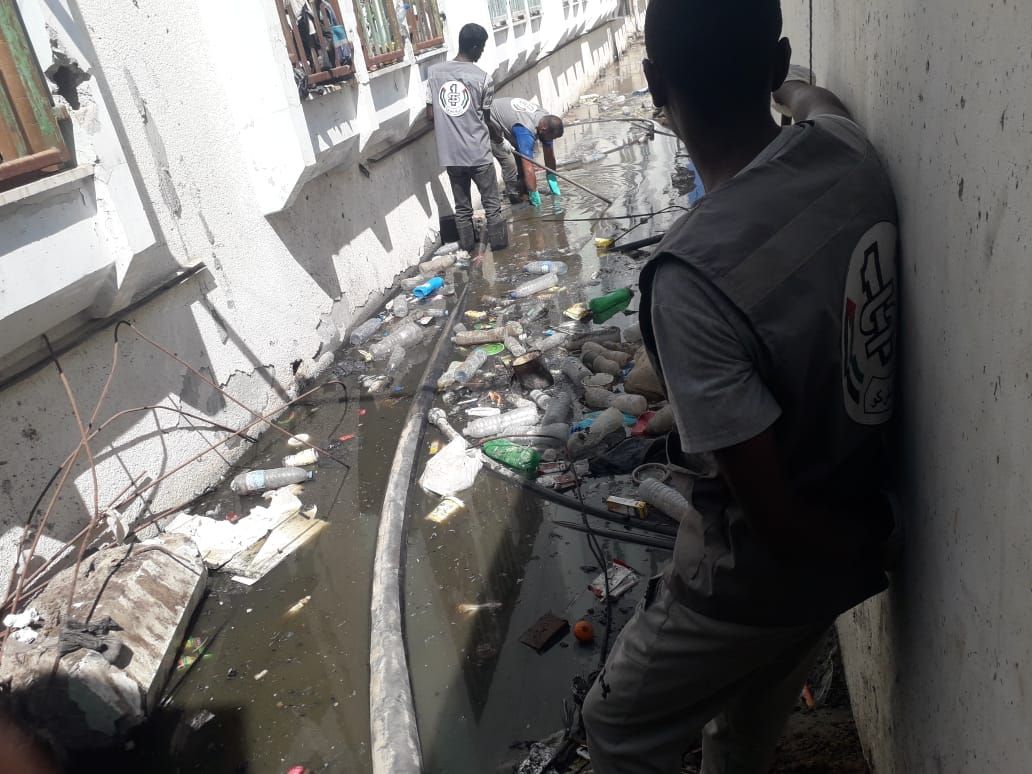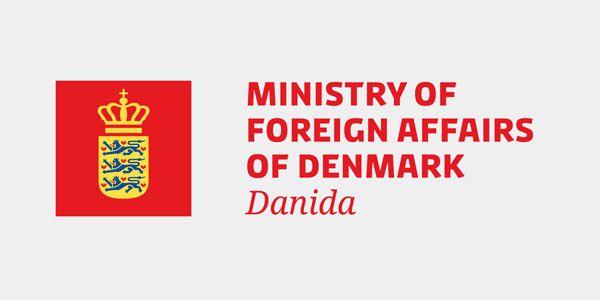The Issue
The October 7th war in Gaza has resulted in widespread destruction of housing units, water wells, critical public infrastructure, and services, impacting the 2.3 million Palestinians living in Gaza. There are severe challenges in water production and distribution due to asset losses, fuel shortages, and infrastructure damage. The disruption in sewage management has led to the release of sewage into the Mediterranean Sea and widespread leakages across the Gaza Strip, resulting in ponds of sewage mixed with stormwater. This environmental contamination poses a high risk of diseases related to poor sanitation and hygiene.
Latrines are filling up quickly, and there is limited equipment and space for desludging, complicating the management of full latrines. There is no safe final disposal for sludge since the wastewater treatment plants are not operational, and there is no emergency faecal sludge management system in place. This situation impacts both public health and the dignity of affected people.
Lack of safe and adequate water supplies increases reliance on using water from unreliable water sources, which eventually results in increasing number of acute water diarrhea – particularly among children.
Open defecation and unsafe excreta disposal results in the spread of public health diseases such as Hepatitis A or Cholera not to mention water contamination. Poor hygienic condition and practices due to lack of cleaning and hygiene materials increases the infection of skin and respiratory diseases.
The local market is already depleted of hygiene items (due to restrictions on bringing materials from outside Gaza through the Israeli controlled crossing points), and when available, prices have skyrocketed, making them unaffordable for internally displaced persons.

The Project
The project aimed to address the urgent needs related to water, sanitation and hygiene (WASH). The response provided life-saving services and goods to 6,400 individuals in need in the Middle Governorate of the Gaza Strip. WASH response improved access to water by:
- The provision of safe and adequate drinking and domestic water through trucks.
- Installation of water distribution points to minimize queueing.
- Distribution of water storage supplies (i.e., jerrycans).
The sanitation conditions were addresses by:
- The provision/installation of gender and culturally appropriate locally produced latrines and showers.
- Repairs and cleaning services for the WASH facilities allowing safe and secure access to latrines and showers and ensure privacy, particularly for women and girls.
- The project ensured safe excreta disposal and management through wastewater desludging to avoid wastewater overflow.
The hygiene aspects were addressed through:
- Distribution of hygiene materials to ensure better hygiene practices .
- Implementation of hygiene promotion activities. These activities addressed the risky behaviours related to waterborne and infectious diseases and personal hygiene practices in light of the limited resources available for internally displaced persons.

The Results
During the project period, 6,400 war affected people gained improved access to comprehensive water sanitation and hygiene services. The 6,400 internally displaced persons inside three shelters in Der Al Balah gained daily access to safe drinking and domestic water over four months through water trucking and installation of water distribution points.
The displaced persons also accessed proper toilets and showers through installation of new latrines, repairs and cleaning of the existing WASH facilities inside the shelters, and wastewater desludging activities. 1,400 families gained access to hygiene items and received hygiene awareness.
DCA/NCA managed to procure the hygiene material using the cross-border supply chain, while the distribution process were done jointly by DCA/NCA and a partner in Gaza.
The video below shows some of the activities carried out as part of the project:
Naeem’s Story
One of the many people reached through the project was Mr. Naeem Thabet Salah Badawi. Naeem is 33 years old, is married and has two children. He expressed how he and his family had faced immense suffering during their displacement from Gaza to Khan Younis, then to Rafah, before finally settling in Shaheen shelter west of Deir Al-Balah. The family of four was forcibly displaced to what was called the “safe zone,” all while under constant bombardment. Their main concerns were finding drinkable water and a private bathroom amid deteriorating humanitarian conditions.

Naeem pointed out that the situation in Shaheen shelter was dire in the beginning, with only a small amount of non-drinkable water available. The difficulties increased as more displaced people arrived at the shelter. Although many organisations visited the camp, only a few responded to their needs. DCA/NCA was one of the few that took serious and quick action by providing enough water for the shelter, installing portable bathrooms, and assisting in wastewater disposal into existing sewage networks.
DCA/NCA also provided clean water for drinking and washing, which greatly contributed to reducing the spread of skin and intestinal diseases that had been rampant before. Naeem expressed his deep gratitude to DCA/NCA for their efforts. He hoped that the support would continue to alleviate their suffering and strengthen their resilience in the difficult circumstances that he faced.
Tareq’s Story
Another person reached in the project was Mr. Tareq Lubad, a displaced individual from Gaza living in Al-Hassoun shelter in Deir Al-Balah. Tareq described the immense challenges he faced after his displacement: Upon arriving at Al-Hassoun, he found no shelter, water, or basic necessities. After managing to secure a tent for his family with great effort, his daily struggle shifted to securing water, food, and hygiene materials.
Tareq shared that he had to walk long distances to collect small amounts of water, which were not enough for his family’s daily needs. Clean drinking water was almost impossible to access. The lack of hygiene supplies and their high cost worsened the situation, leading to widespread illnesses, especially skin diseases. “Sometimes, we couldn’t bathe for ten days,” he said, adding that they had to wash their hands and dishes with just water or even sand.
The intervention by DCA/NCA brought significant relief to Tareq and his family. The daily provision of water for drinking and washing improved their situation dramatically. Portable toilets installed in the shelter provided a much-needed facility for maintaining personal and community hygiene.
The distribution of hygiene kits brought additional joy, with Tareq describing them as “the first packages to reach us and make such a difference.” He called the initiative a “great humanitarian effort” that restored dignity and improved the quality of life for displaced families.
Our Work
DCA and NCA work in Palestine to support Palestinian communities in Gaza and the West Bank, including East Jerusalem to be economically and socially resilient and active participants in decision making processes affecting their lives. This includes advocating for respect for international humanitarian law, human rights and a just peace. Since October 7, 2023, DCA/NCA has taken part in the humanitarian response to the war in Gaza.
About the project
Full title: Emergency Water, Sanitation and Hygiene (WASH) response to war affected people in Gaza.
Period: July 2024 – December 2024
Funding: DKK 5,000,000
Number of people reached: 6,400
Main Donors: Danida and Augustinus Fonden



